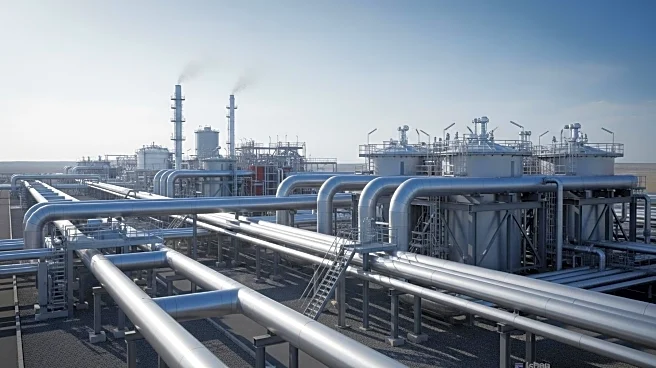What is the story about?
What's Happening?
The Oil and Gas Climate Initiative (OGCI) has released its 2024 Progress Report, highlighting significant advancements in emission reductions and low-carbon investments among its 12 member companies. Since 2017, OGCI members have achieved a 62% reduction in upstream methane intensity, a 72% decrease in routine flaring, and a 24% reduction in upstream carbon intensity. The group's Scope 1 and 2 emissions have fallen by 25%, totaling 304 million tonnes of CO₂ equivalent. Additionally, OGCI members have invested $30 billion in low-carbon projects in 2024, contributing to a cumulative $125 billion since 2017. These investments include carbon capture, utilization, and storage (CCUS) projects, renewable energy, and sustainable fuels. Over 50 CCUS projects are in development, with the potential to reduce or remove up to 500 million tonnes of CO₂ annually by 2030.
Why It's Important?
The progress reported by OGCI is crucial for the global oil industry as it strives to meet climate goals and reduce environmental impact. The substantial reductions in methane emissions and flaring contribute to a cleaner energy sector, aligning with international climate agreements such as the Paris Agreement. The $125 billion investment in low-carbon technologies underscores the industry's commitment to transitioning towards sustainable energy solutions. These efforts not only enhance the environmental performance of OGCI members but also set a precedent for other companies in the sector to follow. The expansion of CCUS projects is particularly significant, as it offers a viable pathway to mitigate carbon emissions on a large scale, potentially transforming the industry's approach to climate change.
What's Next?
OGCI's initiatives are expected to continue influencing the oil and gas sector's approach to emissions and sustainability. The Oil & Gas Decarbonization Charter (OGDC), launched at COP28, is expanding its reach, with 56 signatories representing 45% of global oil production. This charter aims to strengthen transparency and accountability across the industry, with its second annual report anticipated at COP30 in Brazil. As OGCI members work towards eliminating routine flaring by 2030, the focus will likely shift to broader industry adoption of these practices. The ongoing development of CCUS projects will play a critical role in achieving net-zero emissions, encouraging further investment and innovation in carbon-efficient technologies.
Beyond the Headlines
The OGCI's efforts reflect a broader shift in the oil and gas industry towards sustainability and climate responsibility. The emphasis on transparency and accountability through initiatives like the OGDC highlights the growing importance of ethical and environmental considerations in corporate governance. As the industry adapts to these changes, it may face challenges related to regulatory compliance, technological innovation, and market dynamics. The long-term impact of these developments could lead to a more resilient and environmentally conscious energy sector, influencing global energy policies and consumer expectations.
















